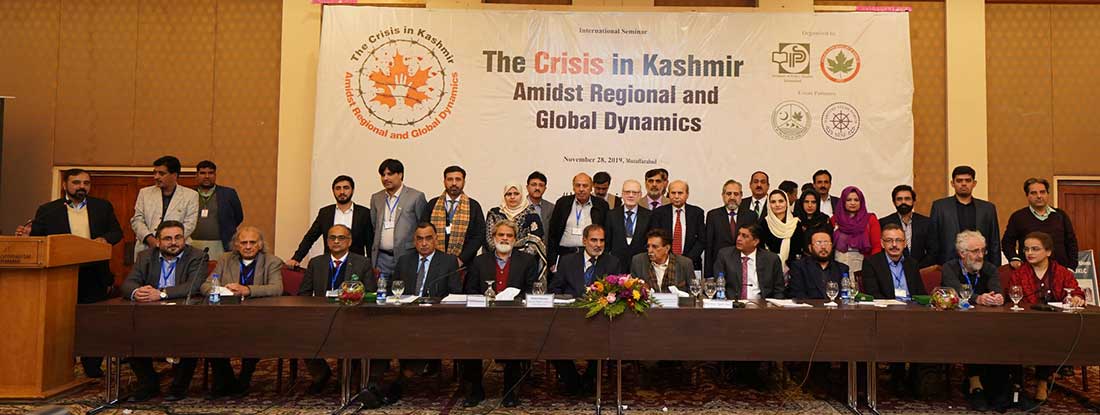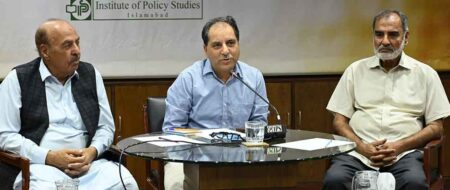Declaration on Kashmir issue
The declaration on Kashmir urges innovative thinking and proactive approach to attract global attention and engagement
The
peaceful resolution of Kashmir issue is going to be a long struggle requiring a
lot of patience, proactive approach, innovative thinking and devising of
well-coordinated, carefully planned, multidimensional strategies, aimed at
attracting global attention while maintaining effective engagement of as many
people, international organizations and states as possible.
This was the crux of a declaration on Kashmir issue that was signed as the conclusion of an international seminar titled ‘The Crisis in Kashmir amidst Regional and Global Dynamics’. The event was organized in Muzaffarabad, AJ&K on 28 November 2019 by Institute of Policy Studies (IPS), Islamabad, in collaboration with Policy Research Forum (PRF), AJK and Maritime Studies Forum (MSF).
The
declaration was signed by Prime Minister of AJ&K Raja Farooq Haider. The
other signatories of the document comprised Khalid Rahman, Executive President
IPS, Dr Syed Muhammad Anwer, law expert and president MSF, Mansoor Qadir Dar,
Acting Chairman PRFAJK, Dr Roger van Zwanenbarg, British historian and
political economy scholar, Dr Yashpal Amarchand Tandon, author and political
activist from the UK, Dr Akis Kalaitzidis, American scholar and author, Dr
Halil Toker, Turkish scholar, Syed Iftikhar Gilani, senior journalist from IoK,
Dr Fazl ul Hadi Wazeen, academic and politician from Kabul, and Farzana Yaqoob,
political activist, among others.
The
points covered in the declaration included:
1. Neither,
status Quo nor Silence are any option, though patience will have to be applied
as it is going to be a long journey, a well-coordinated strategy and work plan
will have to be ensured.
2. Alongside
Routine efforts innovative and creative ways and strategies will have to be
designed to create awareness and engage as many people, institutions, regional
and global organizations and countries as possible.
3. Awareness
and engagement not only outside but within, on nature of conflict and the
immediate, short term and ultimate goals; material in multiple languages,
Kashmir specific diplomacy, Hindutva as a fascist philosophy and way of life,
that needs to be exposed.
4. The
indigenous character of the movement needs to be highlighted, at the same time
individual stories and case studies should be stressed in awareness campaigns,
legal ways and means to fight such cases under the international legal regimes
need to be taken up.
5. Preserving
the consensus environment within; one needs to realize the difference in
maintaining consensus on the goal as against the strategies at a particular
point of time, blame game is suicidal; Focus should remain on Right of Self
Determination which is the most important HR and which has a strong legal
foundation.
6. Prepare
for a long and sustainable movement; IOK is the most important front; they need
messages positive enough to raise or at least maintain their spirits and
resolve; Allow movement of Kashmiris from IoK to visit AJK simply by presenting
the state subject card, blame game only discourages and negatively impacts the
morale and the spirits.
7. Making
AJK a model of good governance.
8. Being
reactive is inevitable in certain cases but important is to be a proactive and
innovative in one’s approach.
9. One
single approach will not work. Multidimensional strategies are needed –
Combination of Political, legal, strategic, economic, and media strategies to
name a few.
10. It
has to be stressed that war is also a tool in the international relations; at
the same time hybrid nature of war in contemporary world needs to be understood
and kept in view in policies and strategies. A well designed Movement towards
achieving self-reliance is inevitable to face the challenges of hybrid war and
external pressures.
11. The
indigenous character of the movement needs to be highlighted, institutionalize
the diaspora, Governments are important but at the end of the day it is the
public opinion that counts.
12. There
are a lot of fronts; one would need to address different stakeholders and their
concerns, which would require keeping in view the attentiveness of various
stakeholders, at the same time one has to set priorities keeping in view the
environment and resources available.
13. Research
and monitoring to understand Indian designs and strategies and develop ideas
for countering them with proper mechanisms in place; India will continue try to
change the goal post as it has been doing since last seventy years.
14. Last
but not the least, Problems the world is facing today, and Kashmir is not just
one but one of the key problems Rooted in poor, or in fact no Global Governance
which is fundamentally founded on the Capitalist paradigm of life.
15. It
has to be emphasized within and without that as a global citizen all of us have
two options:
a. To
continue within the prevailing system of global governance based on the so
called paradigm National Interest and excel.
b.
To
try developing an alternate vision and strive for a peaceful, fairer, just,
equitable global system.












